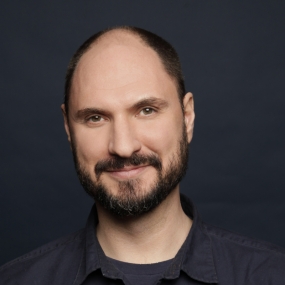Maron and Bouchard on painting
Occasionally, almost at regular but distant intervals, Marc Maron talks about art and painting on his excellent podcast, WTF. In episode 319, he interviews cartoonist, Loren Bouchard, about his life and briefly their conversation gets truthful about the life of painting in a way I love, on principle, even though I hate hearing the truth. Always. (I much prefer the delusional dreaming part, which usually leads into trouble. Like a devotion to painting, for example.) Don’t bother reading on if you’re looking for encouragement. (Praise I like. Always welcome. Encouragement I tend to laugh at. There’s no pot of gold at the end of this oily rainbow.) Painting is not an activity that makes sense, generally, as a way of life, even though I’ve been treading this painting path for decades. It’s good to keep in mind, during a journey like this, that in reality most people don’t pay much attention to painting. I don’t think this is the way it has to be, but the course of visual art has led to this “marginalization” mostly because of the choices artists have made about who they are addressing and how they’re going to do it. I happened to be in the middle of a seven hour session of painting while listening to Maron and Bouchard talk about how irrelevant my investment of time was, as I was investing it, at least to the general “cultural conversation,” whatever that is (though I know exactly what they’re saying and agree). Yesterday my art hours began at 6 a.m. and ended at 11 p.m. (because I have a show coming up and a deadline on Friday), and most of that time was devoted to either art making, frame-building or writing about art. I have no regrets about any of this, in fact I’m gratified by all of it, even though I agree with what’s being said here. Doh!
Maron: Was there any sense when you talk to your father, he was an artist . . . was there a point where you processed the fact that there might be disappointment in his spirit about where his life went? I mean painting’s a tough racket.
It is. No. He didn’t feel it. I think only in the last few years, because he reads a lot and thinks a lot, and I think he’s aware of the extent to which the visual arts have been marginalized in the broader cultural conversation. In the 60s, he felt like being a painter was being in the heart of what art could be. He felt like he was there at ground zero , making . . . .
In New York . . .
In New York at first and then in Boston. Now he sees, wow it didn’t last that long. The relevance of painting in the bigger conversation got cast aside.
You start to realize when you read books about that type of art work . . . painting . . . they’re in there sacrificing their life and sweating over these canvases and when they’re good it looks finished. But you need these patrons and critics to deliver you to the rich people. And then once the rich people enjoy spending money on your paintings and the critics return to it and say we’ve got a star and then the museums say if the rich bought that maybe we should own some. That’s a really tight road to travel.
He became really disillusioned with that. It’s a conversation we have now as it pertains to my work. I think of what I do, making cartoons, as not even really remotely approaching art. Entertainment is a craft. The author, or the many authors, the big collaborative unit that makes the thing, there’s the work, and the last piece is the audience, the critical response. He was raised on a two-point system: the artist and the work.
I bleed. You buy.
Or no one buys but I continue to hone my ability to say what I’m trying to say and do the work and maybe somebody someday will appreciate it or maybe not.
My mother was a painter too and I saw her lose her way. She went back in her early 40s to get her masters but couldn’t handle, she didn’t have the confidence to be there with all these younger people, and kind of buckled and went in search for meaning in other places. For all my life I would go to museums and stand before canvases and I still couldn’t quite wrap my brain around the significance of it because even by the time I was a kid its relevance had drifted.

Comments are currently closed.